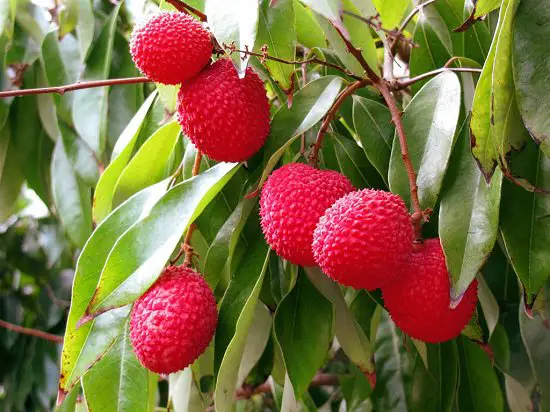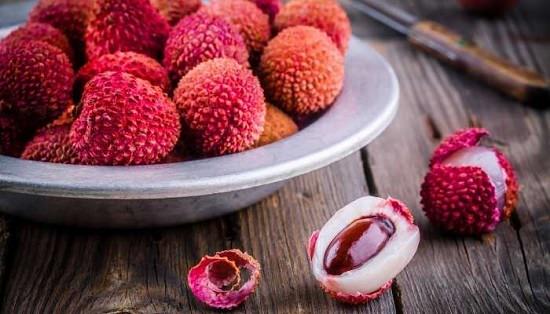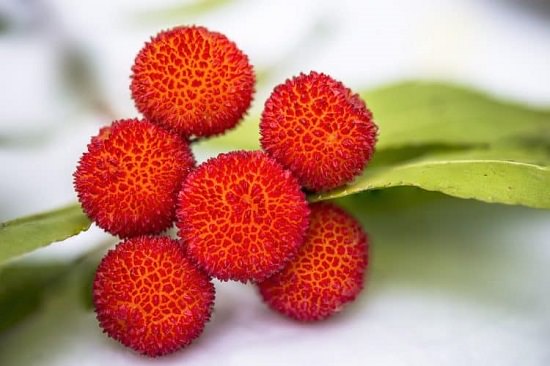What Does Lychee Taste Like? Where it grows and Lychee Benefits. Learn everything related to this aromatic tropical fruit in this detailed article!
What is Lychee?

Lychee (Litchi chinensis) is native to Southern China and grown extensively in China, India, and other Southeast Asian countries. The tall evergreen plant can attain height up to 49-92 feet (15-28 meters). It has evergreen leaves that resist water. Small whitish or yellow-green flowers bloom in clusters usually in spring and early summer in warm climates.
Lychee fruit develops in 70-112 days, depending on the climatic conditions. The fruit grows in oval and round shape, the outer crust is pinkish-red and hardly textured with small and little rough spikes. It’s peeled before consumption. The seeds are not edible as they may cause hypoglycemia since they contain methylene cyclopropyl acetic acid.
Also Read: How to Grow Citrus in Pots
What Does Lychee Taste Like?
Lychee is also known as litchi or leechee. But whatever you spell or say it, the flavor of this fruit is heavenly. It tastes like sweet grapes infused in citrus with the aromatic touch of rose water. After you peel lychee, it looks like a jelly followed by seed. The fleshy fruit primarily consumed fresh, but you can also try canned or dried lychees. If you want to relish the natural taste, then eat them fresh. The natural flavor of the fruit is sweet with a hint of tartness, and it feels like you’re eating something juicy with an exotic fragrance.
Also Read: Is Avocado a Fruit or Vegetable
Where Lychee Grow?
China, Taiwan, India, Madagascar, and Thailand are top commercial growers. The United States, South Africa, Australia, and Mauritius also produce Lychee.
If you have an area with hardiness zone 10 or 11 or any subtropical or tropical climate with no risk of frost, you can grow the lychee tree outside. Avoid a place that promotes waterlogging, save the tree from wind damage, and select a sunny location; afternoon shade would be great in hot climates. After 4-5 years, your lychee plant will become mature and start producing fruits.
How to Eat Lychee

There are three ways of eating lychee:
- Fresh Lychee is the most preferred way, eat it alone or consume in fruit salads or make juices. You can also prepare a Hawaiian Stuffed Lychee Recipe with fresh lychee fruits, macadamia nuts, and mild creamy cheese.
- Canned Lychee is widely used in making fruit salads, shakes, icecreams. You can also use it to garnish lychee martini. To prepare a lychee flavored summer drink, blend it with coconut and lime. Several dishes can be prepared with a blend of this fleshy fruit with apple, raspberry, cucumber, etc. Try to choose a brand that doesn’t use much sugar for preservation.
- Dried Lychee tastes similar to a raisin with a rich aromatic flavor.
Lychee Benefits

There are uncountable lychee benefits, some of them are listed below:
- Lychee contains a very high amount of Vitamin C and B, which makes it good for skin health.
- It is full of fiber and polyphenols that combat cell damage. The fiber content in lychee also helps in weight loss.
- Lychee is high in ascorbic acid.
- It contains enough amount of copper that boosts blood circulation very well.
- Lychees have Lycheetannin A2 that aids in preventing the spread of viruses, and Proanthocyanidins contribute reliable antiviral capabilities.
- It also helps in maintaining blood pressure. As high in potassium and low content of sodium aids in controlling high blood pressure.
- Flavanols, in lychee, act as an anti-inflammatory agent.
- Lychee is full of manganese, copper, iron, magnesium, phosphorus that stimulates the absorption of calcium in bones, which makes them stronger.
When You Should Not Consume Lychee
- If you have diabetes. As lychee contains a high amount of sugar, it will be better to avoid this fruit.
- Don’t consume lychees empty stomach also as it can cause hypoglycemia. Here’s a good read on when you should not eat lychee.


